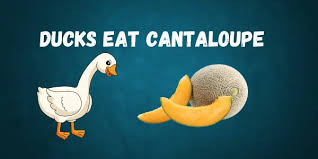Introduction
Can Ducks Eat Cantaloupe: Do you have ducks and wish to feed them occasionally? One of the options that you may be pondering over is giving some particular fruit, a cantaloupe. Meal time has come. But is cantaloupe safe for ducks? The short answer is yes. And to add to that, ducks eat this kind of fruit and love it. However, you must follow some rules to ensure your ducks are healthy and safe. This blog post will highlight everything you need to know about giving cantaloupe to ducks.
We will cover the most critical aspects, such as health benefits, other problems that might be present, and the means through which this food will be offered to the ducks. If you have just ventured as a duck keeper or have already kept ducks for some time and want to expand their diet to the ducks and are very excited about wanting to have that one more treat for them, then read more about feeding ducks with cantaloupe and all that you have got to know.
Do Ducks Eat Cantaloupe? – Is It Safe for Ducks?

Indeed, ducks can eat cantaloupe, which is usually social if fed in moderation. Cantaloupe contains significant components such as vitamin C and vitamin A, potassium, and fiber. These nutrient requirements, though, can help provide the ducks with good health as long as it is done on the right diet. Ducklings can also be introduced to cantaloupe, but the fruit must be cut down into small portions to avoid choking. The flesh of the cantaloupe is what ducks will most likely consume. However, the seeds and rind may also be eaten if well-cooked. They may, however, be given those kinds of seeds, such as watermelon, in the case of choke.
Can Cantaloupe Be a Regular Diet for Ducks?
Nevertheless, even if cantaloupe can be classified as healthy, a watermelon should never be the most appropriate fruit to feed a duck. Astonishingly, a duck must be given a combination of different foods such as proteins, carbohydrates, and fats; they have some vitamins and trace elements, among others. Such foods such as insects, plants, and snails comprise any of these diets.
For example, during summer, when what is given is feed and not grain to ducks, although the kernels wt used l were these kernel in any other form as this is when one feels cantaloupe is the only feeding option, this poses a danger to proper feeding practices, it does to all if at all W.E Even on its own, cantaloupe has small amounts of protein and that cannot be enough to satisfy the constant craving of a duck. Cantaloupe, in that regard, is only to be regarded as a supplementary food and not a major source of nourishment for the duck.
Is Cantaloupe Toxic to Ducks?
Ducks have been reported to eat cantaloupe in fairly large quantities, which is unproven and deadly saturated with no toxicity levels. Cantaloupe juices contain sugar, but they do not have preservatives or any other ingredients that can cause health consequences. However, too much fruit with too much sugar helps them accumulate body fat excessively and other health problems.
Do Ducks Like Cantaloupe?
Definitely! The family, particularly the children, have fruits as snacks, and the ducks are no exception to this rule. The fact is that ducks even love fruits, and cantaloupe isn’t left out as a snack. It’s easy to impress ducks with this juicy, sweet fruit, especially the duck, which loves the flesh more than the seed.
Nutritional Contents Overview of Cantaloupe for Ducks
Here’s a quick look at the nutritional components of cantaloupe, according to USDA data, per 100 grams:
- Water: 90.2 grams
- Calories: 34 kcal
- Protein: 0.82 grams
- Iron: 0.38 grams
- Carbohydrates: 8.16 grams
- Fiber: 0.8 grams
- Potassium: 157 mg
- Sodium: 30 mg
- Calcium: 9 mg
- Zinc: 0.44 mg
2 Major Benefits of Cantaloupe for Ducks
- Cantaloupe’s Nutritional Value is a Big Lead
Cantaloupe can also be classified as a delicious and healthy fruit due to its amazing amount of vitamins and antioxidants, useful even for ducks. Cantaloupe fiber also helps ducks retain Water and digest water water. Antioxidants and Water bolster their immature immune systems, ensuring that ducks stay healthy and do not get sick easily.
- Cantaloupe’s Impact on Reproduction
Cantaloupe also contains nutrients that are very important in assisting duck reproduction. Eggs containing excessive amounts of fibers, wet feedstuffs, and protein enhance the eggshell strength to improve the rate of reproductive performance successfully. Due to the incorporation of its diet, cantaloupe is significantly beneficial for duck hatching.
3 Steps on How to Feed Cantaloupes to Your Duck
Step 1: Cut the Cantaloupe into Small Pieces
Ensure that the cantaloupe pieces are cut into small ones so they do not choking hazard your ducks. This helps them better assimilate and ingest the melon’s meat.
Step 2: Clean the Pieces Thoroughly
Wash the chunks of cantaloupe calf to remove dirt, dust, and other potentially harmful pesticides.
Step 3: Serve According to the Number of Ducks
Cut all the pieces of the melon meant for feeding your ducks and share them appropriately with each duck. Remember: Give your ducks only some of the fragments of cantaloupe at a time.
What Amount of Cantaloupe Can be Given to Ducks?
Since ducks will eat roughly six ounces of food daily, it should be stated that it is okay to provide them with about six ounces of wonderful cantaloupe every day. One cantaloupe usually weighs about forty-eight ounces, so for a rough group of ducks, one cantaloupe can last up to about a week.
3 Precautions to Perform While Feeding Cantaloupes to Your Duck
- Avoid Overfeeding
Feeding to insufficient proportions may also take a part out of the ducks. Even so, excessive feeding, especially of cantaloupe, can cause some bad cases of consumption. Cantaloupe must only be an occasional feed when offered a nutritional and dietary feed other than cantaloupe.
- Prevent Choking
Ducks can choke on cantaloupe seeds. To avoid trouble, dismiss the seeds before giving the chopped herb pieces to your ducks.
FAQs:
Can ducks consume watermelon?
- Yes, ducks can consume watermelon. It is a good treat for them, provided it is only in moderation.
Is the feed diminishably safe for the ducks?
- Yes, ducks can eat the cantaloupe if you take out the seeds and feed them into bits.
Can the seeds of a melon be given to a duck?
- No, ducks should not be given melon seeds, which might stick in their throat.
How many ounces of cantaloupe should the ducks eat per day?
- Ducks can be fed 0.6 ounces of cantaloupe as part of their balanced diet.
Can baby ducks have cantaloupe?
- Yes, baby ducks can have that fruit, but it should be cut into small pieces because they might choke on it.
Which part of the cantaloupe will the ducks eat?
- Ducks can feed on the flesh of a cantaloupe or melon but do not bother them with the rind or the hendes of the melon.
How can a melon help the duck to its normal feeding?
- No, and this is huge as it should only be given to them occasionally and should not be used to replace a duck’s chewing food.
Ducks eat a whole melon; is it safe?
- Feeding too much melon can result in digestive problems, which is why they should be limited.
Can ducks eat cantaloupe in winter?
- Yes, ducks can eat cantaloupe also in winter, but in moderation.
Do ducks like mounts of cantaloupe?
- Most certainly, ducks love the delicacy of the sweet melon and would not mind having it for a snack.
Conclusion
If given as a snack, it is safe to say that melon cantaloupe is a yummy treat that is healthy and very good for your ducks. Although it has some nutritional advantages, this should only be substituted for a normal feeding schedule, with biasing on one food type. Follow all lines set to avert danger when your ducks are taking cantaloupe. By observing cleanliness, slicing the cantaloupe into small pieces, and regulating the feeding quantity, you can safely include this wonderful melon in your ducks’ diet and boost their health. Happy feeding! Let’s meet again for other articles and resources about duck care and nutrition.










